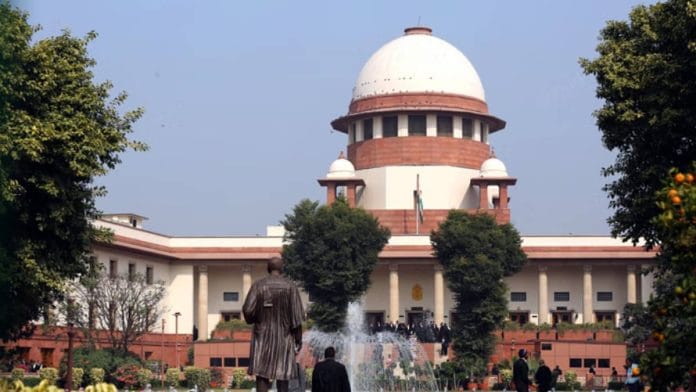New Delhi: A 25-year-old dispute between Bihar and Jharkhand over payment of dues to workers who were employed with state corporations of undivided Bihar remains unresolved despite three Supreme Court judgments.
Now, the top court has appointed a committee under the supervision of one of its retired judge to give “suggestions for a suitable resolution”. Justice (retired) Dinesh Maheshwari will receive a fixed honorarium of Rs 25 lakh for the job, and the amount shall be paid in three equal tranches spread over a period of four months.
Both Bihar and Jharkhand, who together owe Rs 500 crore to the employees, have to equally bear the cost of the honorarium. Additionally, the two states would also provide logistical support to the panel, such as secretarial assistance, one lower division clerk and two law clerks, who may be assigned in accordance with Maheshwari’s choice.
The committee can hold its hearings either in New Delhi, Patna or Ranchi, for which appropriate arrangements shall be made by the state where the meeting is held.
The SC order that aims to end the “unsavoury situation” and redress the grievances of the employees came on a petition filed in 2022. Submitted by a union of employees who worked in the state corporations, the petition sought a direction to both Bihar and Jharkhand to bifurcate assets and liabilities of five inter-state corporations and their respective units in terms of the Bihar Reorganisation Act, 2000.
The direction sought included fixing a timeframe to complete this process and, thereafter, clear the dues of the employees immediately.
A bench of Justices Vikram Nath and Sandeep Mehta deplored that the salary and other claims of the erstwhile employees of the corporations of Bihar post reorganisation of the states remain unsettled even after a period of 25 years, in spite of multiple litigations and repeated directions of the top court.
“Both sides have indulged in levelling allegations and counter-allegations regarding the quantum of dues; the period of entitlement; the identification of the employees concerned, and the modalities of actual payment/disbursement.
“We feel that this unsavoury situation cannot be allowed to continue unabated, and the issue has to be taken to its logical conclusion,” it remarked.
Promulgated more than 25 years ago, the Bihar Reorganisation Act provided for the creation of Jharkhand out of the erstwhile undivided state of Bihar and contemplated bifurcation of the assets and liabilities between the two states. The salaries of the employees remained unpaid, due to which several litigations ensued.
The first round of litigation was initiated by Supreme Court advocate Kapila Hingorani, culminating in a judgment on 9 May 2003. Two years later, in January, on a fresh petition filed by Hingorani, the top court reiterated its 2003 direction.
Through both judgments, the SC asked Bihar and Jharkhand to take a decision regarding the division of the assets and liabilities of the government companies and public sector undertakings in terms of the provisions of the Act.
Despite the pertinent directions, the financial distress of the employees did not meet any redressal. Yet another judgment concerning the plight of unpaid employees was given in 2014, wherein the top court once again directed both states to take a prompt decision in addressing the issue.
Since the matter remained unresolved, a fresh petition was filed in 2022 by the employees’ union. This was followed by two orders that directed the formation of a panel comprising senior bureaucrats from the two states and the Centre. Pursuant to court orders, Bihar and Jharkhand filed affidavits in February, claiming they cleared dues towards the entitlement of the employees.
However, this was disputed by the petitioners. Senior advocate Priya Hingorani, appearing for the employees, argued that emoluments and salaries remain unpaid for around 2,192 employees. Out of these, 316 employees have passed away due to starvation, poverty and inability to access medical treatment.
She said that while the outstanding dues amount to more than Rs 500 crore, the states have so far deposited only Rs 125 crore, which is a minuscule proportion of the total amount, and that too for the period from February 1997 to November 2003. Also, salary dues of only 351 employees, for the six-year period, have been cleared. No payment is forthcoming for the period post November 2003, she informed the court.
Jharkhand and Bihar refuted Hingorani’s contention and demonstrated keenness to clear the dues. However, both conceded that since the original service records of the employees are not available owing to the corporations having gone defunct, the state authorities are finding it extremely difficult to ensure compliance. They were struggling to identify the employees or their family members, which is hampering the disbursement process.
After considering the submissions, the bench observed: “There is no dispute that the salaries and other dues of the erstwhile employees remain unpaid for more than 25 years, and they are desperately seeking redressal of grievances despite a rightful entitlement.”
It also acknowledged the states’ dilemma of not being able to disburse the amount due to the absence of official records. Hence, to ensure that frauds or imposters do not lay claim to the lawful dues of the employees, the bench ordered the constitution of the committee led by Maheshwari, which will undertake a detailed enquiry into the entire factual matrix.
This panel shall fix the proportional liabilities of both states towards salaries, including retiral benefits of the employees, identification of family members of the employees who died while the issue remains unresolved, and the entitlement of the erstwhile employees to receive salary and other retiral benefits.
The bench fixed a timeframe of four months for the committee to submit its report to the court, while directing the two states to make the logistical arrangements by 7 April.
(Edited by Radifah Kabir)
Also Read: The nauseating nepotism and caste-based discrimination that exists in Indian judiciary






